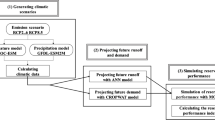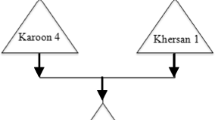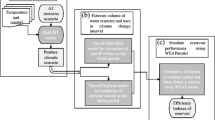Abstract
Assessing the effects of climate change phenomenon on the natural resources, especially available water resources, considering the existing constraints and planning to reduce its adverse effects, requires continuous monitoring and quantification of the adverse effects, so that policymakers can analyze the performance of any system in different conditions clearly and explicitly. The most important objectives of the present research including: (1) calculating the sustainability index for each demand node based on the characteristics of its water supply individually and also calculating the sustainability index of the whole water supply system, (2) investigation the compatible of changes trend among various reservoir performance indexes and (3) evaluation the changes in performance reservoir indexes in the future time period compared to the baseline tie period under three Concentration Pathway (RCP) RCP2.6, RCP4.5 and RCP8.5 scenarios for all water demand nodes and the entire water supply system. To this end, first, climatic parameters data affecting on the water resources such as temperature and precipitation were gathered in the baseline period (1977–2001) and the climatic scenarios were generated for the future period (2016–2040) using the Fifth Assessment Report (AR5) of the International Panel on Climate Change (IPCC). Then, the irrigation demand changes of the agricultural products with the Cropwat model and the value of inflow to the reservoir with the Artificial Neural Network (ANN) model were calculated under the climate change effects. In the next step, the climate change effects on the water supply and demand were simulated using Water Evaluation and Planning model (WEAP), and its results were extracted so as the water management indexes. The results show that the temperature will increase in the future period under all three RCP scenarios (RCP2.6, RCP4.5 and RCP8.5) compared to the baseline period, while precipitation will decrease under the RCP2.6 scenario but will increases under RCP4.5 and RCP8.5 scenarios. Under the trend of changing in temperature and rainfall, the irrigation demand in the agricultural sector in all scenarios will increase compared to the baseline period. However, the inflow of reservoir will decrease under the RCP2.6 and RCP4.5 scenarios and will increases under RCP8.5 scenario. Evaluation of WEAP modeling results shows that the sustainability index of the entire Marun water-energy system will decrease in the future period compared to the baseline period under the RCP2.6, RCP4.5 and RCP8.5 scenarios by 13, 10 and 8%, respectively. The decrease in the system sustainability index shows that in the absence of early planning, the Marun water-energy supply system will face several challenges for meeting the increasing demand of water in different consumer sectors in the coming years.













Similar content being viewed by others
Availability of Data and Materials
Authors have restrictions on sharing data.
References
Abdi-Dehkordi M, Bozorg-Haddad O, Chu X (2021) Development of a combined index to evaluate sustainability of water resources systems. Water Resour Manage 35(9):2965–2985. https://doi.org/10.1007/s11269-021-02880-w
Apaydin H, Feizi H, Sattari MT, Colak MS, Shamshirband S, Chau K-W (2020) Comparative analysis of recurrent neural network architectures for reservoir inflow forecasting. Water 12(5):1500. https://doi.org/10.3390/w12051500
Asghar A, Iqbal J, Amin A, Ribbe L (2019) Integrated hydrological modeling for assessment of water demand and supply under socio-economic and IPCC climate change scenarios using WEAP in Central Indus Basin. J Water Supply Res Technol AQUA 68(2):136–148. https://doi.org/10.2166/aqua.2019.106
Ashofteh PS, Rajaee T, Golfam P, Chu X (2019) Applying climate adaptation strategies for improvement of management indexes of a river-reservoir irrigation system. Irrig Drain 68(3):420–432. https://doi.org/10.1002/ird.2336
Ashofteh PS, Bozorg-Haddad O, Mariño MA (2013) Climate change impact on reservoir performance indexes in agricultural water supply. J Irrig Drain Eng 139(2). https://doi.org/10.1061/(ASCE)IR.1943-4774.0000496
Attari J, Mojahedi SA (2009) Water sustainability index: Application of CWSI for Ahwaz county. World Environmental and Water Resources Congress. https://doi.org/10.1061/41036(342)164
Bannayan M, Paymard P, Ashraf B (2016) Vulnerability of maize production under future climate change: possible adaptation strategies. J Sci Food Agric 96(13):4465–4474. https://doi.org/10.1002/jsfa.7659
Barman S, Bhattacharjya RK (2021) ANN-SCS-based hybrid model in conjunction with GCM to evaluate the impact of climate change on the flow scenario of the river Subansiri. J Water Clim Chang 11(4):1150–1164. https://doi.org/10.2166/wcc.2019.221
Chaves HML, Alipaz S (2006) An integrated indicator based on basin hydrology, environment, life, and policy: The watershed sustainability index. Water Resour Manage 21:883–895. https://doi.org/10.1007/s11269-006-9107-2
FAO, Cropwat (1992). A computer program for Irrigation planning and management, FAO Irrigation and Drainage paper, No. 46 Food and Agriculture Organization, Rome. Available at: http://www.fao.org/land-water/databases-and-software/cropwat/en
Farooq N, Gheewala BH (2020) Assessing the impact of climate change on sugarcane and adaptation actions in Pakistan. Acta Geophys 68:1489–1503. https://doi.org/10.1007/s11600-020-00463-8
Gao J, Christensen P, Li W (2017) Application of the WEAP model in strategic environmental assessment: Experiences from a case study in an arid/semi-arid area in China. J Environ Manage 198:363–371. https://doi.org/10.1016/j.jenvman.2017.04.068
Ghazlbash SK, Zubair M, Manzoor SA, Haq AU, Baloch MS (2021) Socioeconomic determinants of climate change adaptations in the flood-prone rural community of Indus basin, Pakistan. Environ Dev 37:100603. https://doi.org/10.1016/j.envdev.2020.100603
Gohari A, Mirchi A, Madani K (2017) System dynamics evaluation of climate change adaptation strategies for water resources management in central Iran. Water Resour Manage 35:4233–4250. https://doi.org/10.1007/s11269-021-02942-z
Golmohammadi MH, Safavi HR, Sandoval-Solis S, Fooladi M (2021) Improving performance criteria in the water resource systems based on fuzzy approach. Water Resour Manage 35(2):593–611. https://doi.org/10.1007/s11269-020-02739-6
Hashimoto T, Stedinger JR, Loucks DP (1982) Reliability, resiliency and vulnerability criteria for water resources system performance evaluation. Water Resour Res 18(1):14–20. https://doi.org/10.1029/WR018i001p00014
Hatamkhani A, Shourian M, Moridi A (2021) Optimal design and operation of a hydropower reservoir plant using a WEAP-Based simulation–optimization approach. Water Resour Manage 35:1637–1652. https://doi.org/10.1007/s11269-021-02821-7
Hirsch RM (1979) Synthetic hydrology and water supply reliability. Water Resour Res 15(6):1603–1615
Iran Water Resources Management Company Website (2019) Available at: http://www.wrm.ir
Jahad Agricultural Organization of Khuzestan Website (2019) Available at: http://www.ajkhz.ir
Jun KS, Chung E-S, Sung J-Y, Lee KS (2011) Development of spatial water resources vulnerability index considering climate change impacts. Sci Total Environ 409(24):5228–5242. https://doi.org/10.1016/j.scitotenv.2011.08.027
Karamouz M, Mohammadpour P, Mahmoodzadeh D (2017) Assessment of sustainability in water supply-demand considering uncertainties. Water Resour Manage 31(12):3761–3778. https://doi.org/10.1007/s11269-017-1703-9
Khanna T (1990) Foundation of neural networks. Addision-Wesley Publishing Company, USA
Latif SD, Ahmad AN, Sathiamurthy E, Huang YF, El-Shafie A (2021) Evaluation of deep learning algorithm for inflow forecasting: a case study of Durian Tunggal reservoir, Peninsular Malaysia. Nat Hazards 109:351–369. https://doi.org/10.1007/s11069-021-04839-x
Latifi SD, Ahmed AN, Sherif M, Sefelnasr A, EL-Shafie A (2021) Reservoir water balance simulation model utilizing machine learning algorithm. Alex Eng J 60(1):1365–1378
Locks DP (1997) Quantifying trends in system sustainability. Hydrol Sci J 42(4):513–530. https://doi.org/10.1080/02626669709492051
Madani K, Aghakouchak A, Mirchi A (2016) Iran’s socio-economic drought: challenges of water-bankrupt nation. Iran Stud 49:997–1016. https://doi.org/10.1080/00210862.2016.1259286
Mena D, Solera A, Restrepo L, Pimiento M, Cañón M, Duarte F (2021) An analysis of unmet water demand under climate change scenarios in the Gualí river basin, Colombia, through the implementation of Hydro-BID and WEAP hydrological modeling tools. J Water Clim Chang 12(1):185–200. https://doi.org/10.2166/wcc.2019.118
Mirdashtvan M, Najafinejad A, Malekian A, Sa’doddin A (2021) Sustainable water supply and demand management in semi-arid regions: optimizing water resources allocation based on RCPs scenarios. Water Resour Manage 35:5307–5324. https://doi.org/10.1007/s11269-021-03004-0
Mirzaei A, Zibaei M (2020) Water conflict management between agriculture and wetland under climate change: application of economic-hydrological-behavioral modelling. Water Resour Manage 35:1–21. https://doi.org/10.1007/s11269-020-02703-4
Moeeni H, Bonakdari H, Fatemi SE, Zaji AH (2017) Assessment of stochastic models and a hybrid artificial neural network-genetic algorithm method in forecasting monthly reservoir inflow. INAE Letters 13(23). https://doi.org/10.1007/s41403-017-0017-9
Mokashi I, Afzal A, Khan SA, Abdullah NA, Bin Azami MH, Jilte RD, Samuel OD (2020) Nusselt number analysis from a battery pack cooled by different fluids and multiple back-propagation modelling using feed-forward networks. Int J Therm Sci. https://doi.org/10.1016/j.ijthermalsci.2020.106738
Mourad KA, Alshihabi O (2015) Assessment of future Syrian water resources supply and demand by WEAP model. Hydrological Science Journal 61(2):393–401. https://doi.org/10.1080/02626667.2014.999779
Moy W-S, Cohon JL, Revelle CS (1986) A programming model for analysis of reliability, resilience and vulnerability of a water supply reservoir. Water Resour Res 22(4):489–498
Obahoundje S, Ta MY, Diedhiou A, Amoussou E, Kouadio K (2021) Sensitivity of hydropower generation to changes in climate and land use in the Mono Basin (West Africa) using CORDEX dataset and WEAP Model. Environ Prog 8:1073–1097. https://doi.org/10.1007/s40710-021-00516-0
Olsson T, Kämäräinen M, Santos D, Seitola D, Tuomenvirta H, Haavisto R, Lavado-Casimoro W (2017) Downscaling climate projections for the Peruvian coastal Chancay-Huaral Basin to support river discharge modeling with WEAP. J Hydrol 13:26–42. https://doi.org/10.1016/j.ejrh.2017.05.011
Ord T (2020) The precipice: existential risk and the future of humanity. Bloomsbury Publishing, London
Pires A, Morato J, Peixoto H, Botero V, Zuluaga L, Figueroa A (2017) Sustainability assessment of indicators for integrated water resources management. Sci Total Environ 578:139–147. https://doi.org/10.1016/j.scitotenv.2016.10.217
Remilekun AT, Thando N, Nerhene D, Archer E (2020) Integrated assessment of the influence climate change on current and future intra-annual water availability in the Vaal River chatchment. J Water Clim Chang 12(2). https://doi.org/10.2166/wcc.2020.269
Roozbahani A, Behzadi P, Bavvani AM (2020) Analysis of performance criteria and sustainability index in urban stormwater systems under the impacts of the climate change. J Clean Prod 271:122727. https://doi.org/10.1016/j.jclepro.2020.122727
Sakizadeh M (2016) Artificial intelligence for the prediction of water quality index in groundwater systems. Modeling Earth Systems and Environment 2:8. https://doi.org/10.1007/s40808-015-0063-9
Sandoval-Solis S, Mckinney DC, Locks DP (2011) Sustainability index for water resources planning and management. J Water Resour Plan Manag 137:381–390
Swain ED, Gómez-Fragoso J, Torres-Gonzalez S (2017) Projecting impacts of climate change on water availability using artificial neural network techniques. J Water Resour Plan Manag 143(12). https://doi.org/10.1061/(ASCE)WR.1943-5452.0000844
Twinomuhangi R, Sseviiri H, Mulinde C, Mukwaya PI, Nimusiima A, Kato AM (2021) Precipitations and vulnerability to climate change among the urban poor in Kampala city, Uganda. Reg Environ Chang J 21(39). https://doi.org/10.1007/s10113-021-01771-5
Venkatappa M, Sasaki N, Han P, Abe I (2021) Impacts of droughts and floods on croplands and crop production in southeast Asia- an application of Google Earth Engine. Sci Total Environ 795:148829. https://doi.org/10.1016/j.scitotenv.2021.148829
Vergara W, Deeb A, Leino I, Kitoh A, Escobar M (2011) Assessment of the impacts of the climate change on mountain hydrology: development of a methodology through a case study in the Andes of Peru. World Bank, Washington DC
Vieira J, Cunha MC, Luís R (2018) Integrated assessment of water reservoir systems performance with the implementation of ecological flows under varying climatic conditions. Water Resour Manage. https://doi.org/10.1007/s11269-018-2153-8
Vijay S, Kamaraj K (2021) Prediction of water quality index in drinking water distribution system using activation functions based Ann. Water Resour Manag 35:535–553. https://doi.org/10.1007/s11269-020-02729-8
Wickramasinghe MRCP, De Silva RP, Dayawansa NDK (2021) Climate change vulnerability in agriculture sector: An assessment and map** at divisional secretariat level in Sri Lanka. Earth Systems and Environment 5:725–738. https://doi.org/10.1007/s41748-021-00206-9
Woznicki SA, Nejadhashemi AP, Parsinejad M (2015) Climate change and irrigation demand: Uncertainty and adaptation. J Hydrol 3:247–264. https://doi.org/10.1016/j.ejrh.2014.12.003
Yazdandoost F, Moradian S, Izadi A (2020) Evaluation of water sustainability under a changing climate in Zarrineh river basin, Iran. Water Resour Manage 34:4831–4846. https://doi.org/10.1007/s11269-020-02693-3
Zhou T, Wu P, Sun S, Li X, Wang Y, Luan X (2017) Impact of future climate change on regional crop water requirement- A case study of Hetao irrigation district, China. Water 9(6):429. https://doi.org/10.3390/w9060429
Author information
Authors and Affiliations
Contributions
Parvin Golfam developed the theory and performed the computations. P.-S. Ashofteh verified the analytical methods. P.-S. Ashofteh encouraged Parvin Golfam to investigate a specific aspect. P.-S. Ashofteh supervised the findings of this work. All authors discussed the results and contributed to the final manuscript. Parvin Golfam wrote the manuscript with support from P.-S. Ashofteh. P.-S. Ashofteh conceived the original idea.
Corresponding author
Ethics declarations
Ethical Approval
The paper is not currently being considered for publication elsewhere. All authors have been personally and actively involved in substantial work leading to the paper, and will take public responsibility for its content.
Consent to Participate
Informed consent was obtained from all individual participants included in the study.
Consent to Publish
The participant has consented to the submission of the case report to the journal.
Conflict of Interest
None.
Additional information
Publisher's Note
Springer Nature remains neutral with regard to jurisdictional claims in published maps and institutional affiliations.
Rights and permissions
Springer Nature or its licensor holds exclusive rights to this article under a publishing agreement with the author(s) or other rightsholder(s); author self-archiving of the accepted manuscript version of this article is solely governed by the terms of such publishing agreement and applicable law.
About this article
Cite this article
Golfam, P., Ashofteh, PS. Performance Indexes Analysis of the Reservoir-Hydropower Plant System Affected by Climate Change. Water Resour Manage 36, 5127–5162 (2022). https://doi.org/10.1007/s11269-022-03295-x
Received:
Accepted:
Published:
Issue Date:
DOI: https://doi.org/10.1007/s11269-022-03295-x




